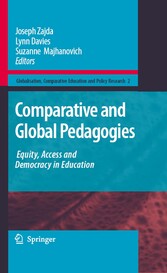Search and Find
Service
Chapter 4
Equity and Democratic Education in Ghana: Towards a Pedagogy of Difference (p. 49-50)
George J. Sefa Dei and Riyad Shahjahan
4.1 Introduction
This chapter examines equity and democratic education in Ghana, focussing on the practice and pedagogy of [social] difference. It is based on the findings of a longitudinal study in selected Ghanaian schools, colleges and universities, in which students, educators, school administrators and policy officials in the local Ministry of education reflect on how their schools deal with ethnic, gender, class, religious, linguistic, [dis]ability and cultural differences among the school population.
This chapter utilizes a critical anti-colonial discursive framework to theorize the nature and extent of on-going colonial relations in schools drawing on the implications for knowledge production, subject identity formation and the pursuit of agency for resistance. It is argued that a critical anti-colonial prism to understanding schooling practices offers possibilities for charting the course/path of educational change. It is also contended that in order to create a truly democratic society we must see inclusion and inclusiveness as paramount.
Equity is about social justice and treating people fairly in deep recognition of the differences in power and relations of power that exist in society (Dei et al., 2006, Zajda et al., 2006). The struggle for equity entails working to address such social imbalances informed by an ideology supporting the notion that those privileged have the burden to work towards a redistribution of social power. Such power is material, discursive, ideological and symbolic. In this discussion of equity and democratic education we bring an understanding to ‘equity’ that affirms the physical, material, emotional, social and spiritual well being of both the self and the collective.
The affirmation arises from a recognition of each other’s fundamental freedoms and rights to the valued goods and services of society, while at the same time fulfilling the accompanying responsibilities. Sound equity practice requires that we note differentials in our advantages and disadvantages at the systemic and institutional levels. It also means that we point to the practices that reproduce privilege and dominance for some while punishing and disadvantaging others. The affirmation of our self worth and collective existence, rights to the valued social goods of society, and the accompanying responsibilities in themselves is an exercise in true democracy. We maintain that democratic education is reflected in a school system that is able to address the questions of power, identity, difference, rights and responsibilities in its politics of citizenry (see also Apple, 1993, Giroux, 1992, Mclaren, 1995, Portelli &, Solomon, 2001, Zajda, 2005).
In choosing to address the topic of equity and democratic education in Ghana, we hope to bring a generosity of spirit and openness to debates around pedagogies of difference. Our learning objective is to join in a thoughtful dialogue on equity and inclusive practices in Ghanaian schools that focus on the practice and pedagogy of [social] difference – ethnic, gender, class, linguistic, religious, ability differences. It is our contention that to create a truly democratic society we must see inclusion and inclusiveness as paramount.
All prices incl. VAT













